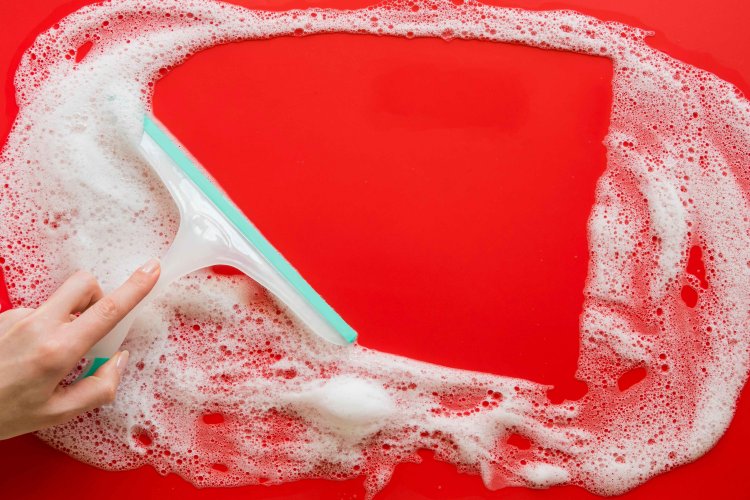The Ultimate Guide to Dishwashing Powder: Clean, Cost-Effective, Eco-Friendly
Share this Post to earn Money ( Upto ₹100 per 1000 Views )

Don’t you ever think about how dishes get clean without so much effort? The secret is dishwashing powder. This simple yet powerful cleanser easily breaks down grease and food debris. Not only is it inexpensive and efficient, but it also has better environment-friendly properties than liquid detergents. Learn more reasons why choosing dishwashing powder for your kitchen makes sense and how it makes post-meal cleaning a lot easier.
What Is Dishwashing Powder?
Dishwashing powder is a cleaning agent designed to remove food residues, grease, and stains from dishes, utensils, and kitchenware. Unlike liquid dishwashing detergents, dishwashing powders come in a dry, granular form. They are formulated with a combination of surfactants, enzymes, abrasives, and other cleaning agents to effectively tackle grease and grime.
Benefits of Using Dishwashing Powder
-
Effective Cleaning Power
Breaks Down Grease
Has enzymes that help dissolve fats as well as stubborn food particles.
Cleans Thoroughly
Dishware will be spotless after using surfactants to lift off dirt.
-
Cost-Effective
Concentrated Formula
A small amount of powder goes a long way, meaning you can have more washes from one box.
Less Waste
In the long term, powders are generally friendlier to pockets than liquids.
-
Eco-Friendly
Biodegradable Ingredients
A number of the powders are made with things that decompose naturally and are less harmful to the environment.
Reduced Packaging
Liquids have more packaging or recyclable or minimal packaging when compared to powders in most cases.
-
Versatile Use
Multi-Purpose
Handy beyond dish-washing such as oven grills or sticky surfaces.
Dishwasher Friendly
Suitable for both manual washing up and machine cleaning.
-
Easy to Use
Simple Application
For this add on your dishwasher or sink the quantity recommended for dishwasher.
Dishwashing powders are made from a combination of various ingredients, each serving a specific purpose
Surfactants
These are the active cleaning agents that help break down grease and lift food particles from dishes.
Enzymes
Enzymes target specific types of stains, such as protein or starch-based residues, breaking them down for easier removal.
Builders
Builders enhance the effectiveness of surfactants by softening the water, preventing the formation of soap scum.
Bleaching Agents
These are included to help remove stubborn stains and whiten dishes.
Anti-foaming Agents
These prevent excessive foaming, which can be a problem in dishwashers.
Fragrances
Added to leave a fresh scent on cleaned dishes.
Tips for Better Usage of Dishwashing Powder
Quantity for use
Check the quantity on the pack or as recommended by the manufacturers. Too much will cause excess suds and residues while too little may not clean effectively.
Pre-Rinsing
Despite improved performance in handling food leftovers, it is advisable to lightly rinse your dishes before using powder.
Proper Storage
Dishwashing powder should be stored at a dry place where it remains free from clumping or losing its efficacy.
How to use dishwashing powder?
Prepare the Sink
Fill your sink with warm water. The water should be hot enough to help dissolve the powder but not so hot that it’s uncomfortable to work with.
Measure and Dissolve the Powder
Add a small amount of dishwashing powder to the water. Start with about one teaspoon per gallon of water. Stir the water to dissolve the powder completely.
Soak the Dishes
Place your dishes, utensils, and cookware into the soapy water. Allow them to soak for a few minutes, especially if they have stubborn residues.
Scrub the Dishes
Use a sponge or dishcloth to scrub the dishes, focusing on any areas with stuck-on food or grease. The powder will help break down and lift food particles.
Rinse Thoroughly
After scrubbing, rinse the dishes thoroughly with clean water to remove any remaining powder and residues
Precautions for use
-
Managing Prevent Consumption
If consumed, dishwashing powders may be toxic. Make sure that pets and youngsters cannot access them.
-
Skin Contact
Extended skin contact may irritate the skin. If your skin is sensitive or you handle the powder a lot, wear gloves.
-
Eye Protection
If something gets in your eyes, wash them well with water and get help if the irritation doesn't go away.
Environmental and Health Considerations
Dishwashing powders often contain chemicals that can impact the environment. Many brands now offer eco-friendly versions that use biodegradable ingredients and minimal packaging. If environmental concerns are important to you, look for products labelled as environmentally friendly or those certified by recognized organisations.
Conclusion
To select the best dishwashing powder, you need to consider your specific needs and preferences. By examining factors such as ingredients, water hardness, and environmental impact, you can find a product that ensures clean, spotless dishes with minimal effort. Whether you opt for a powerful, high-performance brand or a more eco-friendly option, Uniquely Natural offers solutions that cater to both needs. Choosing the right dishwashing powder from Uniquely Natural can enhance your cleaning efficiency while aligning with your values and preferences.

 Malex443
Malex443 












